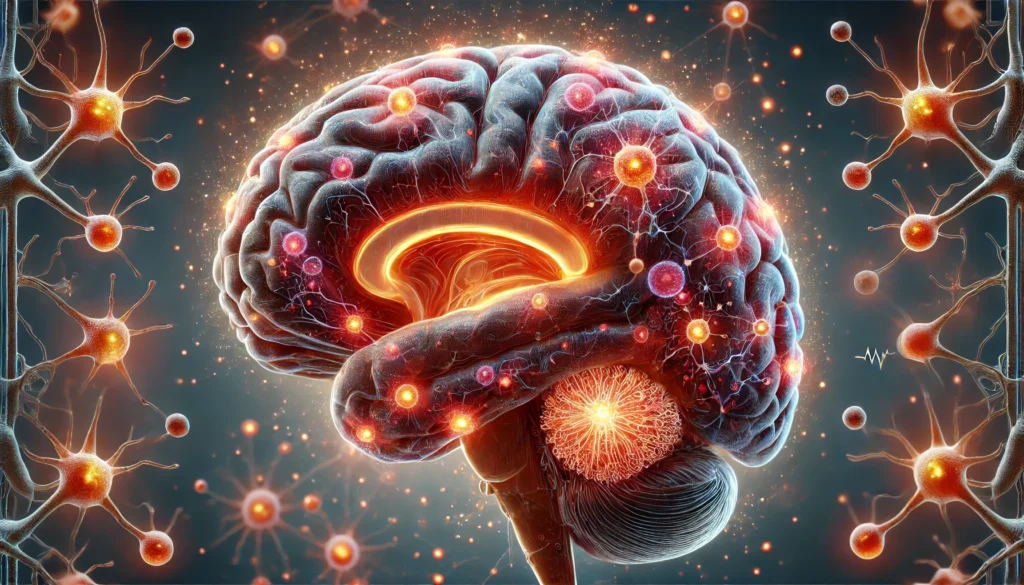Introduction
Dementia is one of the most pressing public health challenges of our time, affecting millions of individuals and families across the globe. As populations age, the prevalence of dementia-related conditions, including Alzheimer’s disease and other forms of cognitive decline, continues to rise dramatically. While pharmaceutical treatments can provide some symptomatic relief, they often come with significant limitations and side effects. In response, many patients and caregivers are seeking complementary approaches to care—ones that address the root causes of neurodegeneration while supporting the whole person. This has led to a surge of interest in holistic medicine for dementia, as well as growing curiosity about natural remedies for dementia that may help maintain or even improve cognitive health.
You may also like: How to Stop Cognitive Decline: Science-Backed Steps for Prevention and Brain Longevity
The shift toward natural medicine for dementia is rooted in a desire to explore safer, more integrative care strategies—ones that draw from nutrition, lifestyle interventions, traditional healing systems, and modern neuroscience. Importantly, these methods do not replace medical treatment when necessary but instead offer natural help for dementia that may improve quality of life, reduce symptoms, and slow progression. In this article, we explore the science behind these approaches, review some of the most promising evidence-based natural ways to treat dementia, and offer insights into what patients and families can realistically expect from holistic interventions.
Understanding Dementia: A Complex, Multifaceted Condition
Dementia is not a single disease but rather an umbrella term for a range of conditions that affect memory, thinking, behavior, and the ability to perform everyday tasks. Alzheimer’s disease is the most common type, but others include vascular dementia, Lewy body dementia, and frontotemporal dementia. The underlying causes of these conditions are varied—ranging from neuroinflammation and oxidative stress to vascular injury, toxic protein accumulation, and mitochondrial dysfunction.
One of the key reasons why natural remedies for dementia are gaining attention is because conventional medications typically target symptoms rather than root causes. Holistic approaches, by contrast, aim to understand and address the physiological, nutritional, emotional, and even spiritual contributors to cognitive decline. Natural medicine for dementia often focuses on reducing chronic inflammation, optimizing mitochondrial energy production, supporting detoxification pathways, and improving cerebral blood flow—all of which can contribute to brain health and resilience.
In recent years, scientific research has begun to validate many of these approaches. From plant-based compounds that enhance memory to lifestyle practices that influence neuroplasticity, the evidence is accumulating that natural ways to treat dementia are not only plausible but potentially powerful. Integrative practitioners are increasingly combining traditional knowledge with modern diagnostics to create personalized care plans rooted in holistic principles.

The Role of Inflammation and Oxidative Stress in Dementia
Inflammation and oxidative stress are among the most critical underlying drivers of neurodegeneration. In individuals with dementia, the brain often shows elevated levels of pro-inflammatory cytokines and free radicals, which damage neurons and disrupt signaling pathways. The body’s natural antioxidant defenses may be overwhelmed, leading to a vicious cycle of cellular injury and functional decline.
Holistic medicine for dementia prioritizes reducing this inflammatory burden. Dietary interventions that emphasize antioxidant-rich foods—such as berries, leafy greens, and turmeric—are foundational. Similarly, omega-3 fatty acids found in fatty fish and flaxseeds have been shown to reduce inflammation and support membrane integrity in neurons. Herbal remedies like curcumin (from turmeric), ginkgo biloba, and ashwagandha have also demonstrated neuroprotective effects in various studies.
Natural help for dementia in this context often involves tailoring a person’s diet and supplement regimen to combat systemic inflammation and oxidative damage. This may also include addressing environmental toxins, chronic infections, or gut dysbiosis—all of which can fuel inflammation and compromise brain function.

Nutritional Approaches to Brain Health
Nutrition is one of the most important yet overlooked areas of dementia prevention and care. Research shows that dietary patterns such as the Mediterranean diet, DASH (Dietary Approaches to Stop Hypertension), and MIND (Mediterranean-DASH Intervention for Neurodegenerative Delay) can significantly reduce the risk of cognitive decline.
These diets are naturally high in antioxidants, fiber, healthy fats, and phytonutrients. They emphasize whole foods over processed ones, plenty of vegetables and fruits, legumes, nuts, seeds, and lean protein. Natural remedies for dementia often begin in the kitchen, where nutrient density, anti-inflammatory properties, and blood sugar regulation can play powerful roles in preserving brain health.
Specific nutrients have also been identified as critical for cognitive function. B vitamins—especially B6, B12, and folate—are essential for methylation and homocysteine regulation, both of which affect brain aging. Vitamin D, magnesium, and choline are also crucial for memory, mood, and mental clarity.
Natural medicine for dementia may include targeted supplementation based on lab testing. This personalized nutrition model is a hallmark of holistic medicine and allows for strategic use of natural compounds to fill nutritional gaps and support brain repair.

Herbal and Botanical Therapies
Many cultures around the world have long relied on herbal medicine to treat cognitive concerns. Today, these traditions are being re-evaluated through the lens of modern science, and several botanicals have shown potential in supporting memory and mental clarity.
Ginkgo biloba, one of the most studied herbs for cognitive health, has been shown to improve blood flow to the brain and may enhance memory and executive function. Bacopa monnieri, a staple in Ayurvedic medicine, has adaptogenic properties and can promote learning and recall. Lion’s mane mushroom contains compounds that stimulate nerve growth factor (NGF), potentially aiding neurogenesis and synaptic repair.
When used correctly and under the guidance of a trained professional, herbal remedies represent an effective natural remedy for dementia patients. These plants often work synergistically with diet and lifestyle to enhance brain resilience and slow cognitive decline.
Holistic practitioners may combine multiple herbs in customized formulas, considering each patient’s constitution, symptoms, and other medical conditions. This individualized approach is a defining characteristic of holistic medicine for dementia and reflects the broader philosophy of treating the whole person, not just the disease.

Lifestyle Interventions: Exercise, Sleep, and Cognitive Engagement
Beyond nutrition and herbal therapy, lifestyle plays a pivotal role in dementia prevention and treatment. Physical activity has consistently been shown to enhance brain function, increase neurotrophic factors like BDNF (brain-derived neurotrophic factor), and improve mood—all of which contribute to cognitive vitality.
Regular aerobic exercise, strength training, and even mind-body practices like yoga and tai chi are all considered valuable natural ways to treat dementia. These forms of movement support vascular health, reduce stress hormones, and foster better sleep—all crucial factors for maintaining brain integrity.
Sleep itself is fundamental to cognitive performance and neurorepair. During deep sleep, the brain clears metabolic waste via the glymphatic system. Poor sleep has been linked to increased beta-amyloid accumulation, a hallmark of Alzheimer’s disease. Therefore, addressing insomnia and optimizing circadian rhythms are key components of natural medicine for dementia.
Engaging in mentally stimulating activities—such as puzzles, reading, music, and social interaction—can also help build cognitive reserve and delay decline. This multifaceted approach aligns with the principles of holistic medicine by viewing the brain as part of a dynamic, interconnected system that thrives when all aspects of life are in balance.
Emotional and Spiritual Health in Dementia Care
Cognitive decline does not occur in a vacuum. Emotional well-being, sense of purpose, and spiritual connection all influence how individuals experience and manage dementia. Natural help for dementia may include practices that nourish these dimensions—such as mindfulness, meditation, prayer, or creative arts.
Studies have shown that chronic stress, depression, and social isolation can worsen cognitive function and accelerate brain aging. Conversely, emotional support, meaningful engagement, and a sense of belonging can buffer against decline and improve quality of life. Holistic medicine for dementia often incorporates counseling, group therapy, or spiritual guidance to address the emotional landscape of both patients and caregivers.
Integrative care plans might include nature therapy, music therapy, or expressive arts to tap into parts of the brain that remain active even as memory fades. These approaches foster joy, connection, and dignity, which are essential for compassionate dementia care.
Environmental Toxins and Brain Health
Another area gaining attention is the role of environmental toxins in cognitive decline. Heavy metals like lead, mercury, and aluminum, as well as pesticides, air pollution, and plastic-derived compounds, have all been implicated in neurodegeneration.
Natural remedies for dementia may include detoxification strategies aimed at reducing the body’s toxic burden. This can involve dietary changes, sauna therapy, binders like activated charcoal or chlorella, and liver support herbs such as milk thistle.
While detoxification must be approached carefully—especially in older adults with compromised systems—it can be a critical aspect of natural medicine for dementia. Lab testing for heavy metal exposure, mold toxicity, or chemical sensitivity may guide practitioners in developing safe and effective detox protocols tailored to the individual’s needs.
Integrating Conventional and Holistic Approaches
It’s important to recognize that natural medicine for dementia is not necessarily an alternative to conventional care but can be a powerful adjunct. Integrative medicine brings together the best of both worlds—combining evidence-based natural therapies with appropriate use of pharmaceuticals and diagnostic tools.
Patients may choose to use holistic methods to enhance their response to standard treatments, reduce medication side effects, or address symptoms not well-managed by drugs. For example, someone taking a cholinesterase inhibitor may also benefit from a personalized nutritional protocol, exercise plan, and stress reduction techniques that support brain health from multiple angles.
Effective integration requires collaboration among healthcare providers, clear communication, and shared decision-making. As more physicians recognize the value of holistic medicine for dementia, interdisciplinary teams are emerging that can guide patients through a wide spectrum of treatment options.
Emerging Research and the Future of Natural Dementia Care
The field of dementia research is rapidly evolving, and scientists are beginning to explore the mechanisms behind natural compounds and holistic practices with greater rigor. New studies are investigating how polyphenols, flavonoids, adaptogens, and dietary interventions can influence gene expression, mitochondrial function, and neuroinflammation.
Technologies like functional MRI, genomic testing, and metabolomics are allowing researchers to study the effects of natural help for dementia at a cellular level. This precision medicine approach supports the creation of highly personalized care plans that adapt over time as patients’ needs change.
Meanwhile, public awareness of natural remedies for dementia is growing, and more patients are seeking out integrative providers who can offer science-backed, compassionate care. As demand rises, it is critical to maintain high standards of training, ethical responsibility, and evidence-based practice within the field of holistic dementia care.
Frequently Asked Questions
1. What are the most effective natural remedies for dementia according to current research?
Several natural remedies for dementia have shown promising results in clinical and preclinical studies. These include curcumin, omega-3 fatty acids, ginkgo biloba, and bacopa monnieri. Additionally, lifestyle modifications such as the MIND diet, regular physical activity, quality sleep, and cognitive engagement are well-supported. These interventions work synergistically to reduce inflammation, support brain function, and delay cognitive decline. However, effectiveness may vary depending on the type of dementia, individual genetics, and the timing of intervention.
2. How does holistic medicine for dementia differ from conventional treatment?
Holistic medicine for dementia focuses on treating the whole person rather than just addressing symptoms. It includes nutrition, herbs, mind-body practices, emotional support, detoxification, and personalized lifestyle adjustments. While conventional medicine often relies on pharmaceuticals that target neurotransmitter activity, holistic approaches aim to restore overall physiological balance, reduce underlying inflammation, and improve the patient’s quality of life. The two can be used together for a more comprehensive care strategy.
3. Can natural medicine for dementia reverse cognitive decline?
While there is no known cure for dementia, certain natural medicine for dementia protocols may help slow its progression and improve symptoms. These therapies may support neuroplasticity, reduce oxidative stress, and enhance mitochondrial function. Reversal is more likely in cases of mild cognitive impairment or when dementia is caused by reversible factors like nutrient deficiencies or toxin exposure. Early intervention is critical, and results depend on a personalized, multifactorial approach.
4. What are safe and effective natural ways to treat dementia at home?
Some safe and effective natural ways to treat dementia at home include adopting a brain-healthy diet, engaging in regular exercise, using music and art therapy, practicing meditation or mindfulness, and ensuring proper sleep hygiene. Herbal supplements like lion’s mane or bacopa can also be used, preferably under professional guidance. Establishing a daily routine that includes cognitive tasks and social interaction can also support cognitive function. Safety measures should be considered to protect those with advanced symptoms.
5. Are there any natural remedy for dementia patients that can help with anxiety or mood?
Yes, several natural remedies for dementia patients can support emotional well-being. Ashwagandha and lemon balm are known for their calming effects. Omega-3s help regulate mood and reduce depressive symptoms, while magnesium supports the nervous system and may alleviate anxiety. Aromatherapy with lavender or bergamot can provide soothing sensory input. These natural interventions are often used to improve mood, reduce agitation, and enhance the emotional state of dementia patients.
6. How can caregivers support natural help for dementia in daily routines?
Caregivers play a vital role in implementing natural help for dementia. They can ensure patients receive nutrient-dense meals, adhere to supplement schedules, and participate in cognitive and physical activities. Encouraging emotional expression, providing spiritual support, and maintaining a calm, structured environment also contribute to well-being. Caregivers should be educated on holistic practices and encouraged to collaborate with integrative health professionals to tailor interventions appropriately.
7. Is there scientific evidence backing the use of herbs and supplements in dementia care?
Yes, a growing body of research supports the use of herbs and supplements as part of dementia care. Studies have examined compounds like ginkgo biloba, curcumin, and DHA for their neuroprotective properties. Some have demonstrated improvements in memory, attention, and executive function, while others show reductions in oxidative stress and inflammation. However, quality varies among supplements, and scientific rigor must be applied when interpreting results. Consultation with a knowledgeable practitioner is recommended.
8. Can detoxification play a role in natural medicine for dementia?
Detoxification can play a supportive role in natural medicine for dementia, especially when exposure to environmental toxins is suspected. This may include addressing heavy metal accumulation, mold exposure, or pesticide residues. Methods such as sauna therapy, chelation (when appropriate), herbal detoxifiers, and dietary fiber can help eliminate harmful substances. However, detoxification should be medically supervised, especially in older adults, to avoid overburdening the body’s excretory systems.
9. Are there risks involved with using natural remedies for dementia?
While many natural remedies for dementia are considered safe, there are potential risks if used improperly. Some herbs may interact with medications or exacerbate pre-existing conditions. Over-supplementation can lead to imbalances, and unverified products may lack quality control. It’s essential to work with qualified healthcare providers familiar with both conventional and holistic treatments to ensure safety, monitor progress, and adjust protocols as needed.
10. What is the best approach to combining conventional and holistic medicine for dementia?
The best approach is an integrative one that respects the strengths of both conventional and holistic medicine. Patients should undergo a thorough assessment to determine the root causes of cognitive decline and then build a multidisciplinary care plan. This might include medical treatment, nutritional therapy, herbal support, cognitive exercises, and emotional or spiritual counseling. Ongoing communication between healthcare providers ensures safety, effectiveness, and optimal outcomes.

Conclusion
As our understanding of dementia deepens, it’s becoming clear that no single solution can address the full complexity of cognitive decline. Holistic medicine for dementia offers a comprehensive and personalized approach that complements conventional treatments and empowers individuals to take a proactive role in their brain health. By embracing natural remedies for dementia—ranging from nutritional strategies and herbal therapies to lifestyle interventions and emotional support—we can help patients live with greater dignity, function, and fulfillment.
The growing body of research on natural medicine for dementia affirms the importance of looking beyond pharmaceuticals to a more integrative model of care. These approaches not only offer natural help for dementia symptoms but also foster systemic balance and overall well-being. With careful guidance, scientific discernment, and compassionate caregiving, natural ways to treat dementia can become a meaningful part of the journey toward cognitive resilience.
Was this article helpful? Don’t let it stop with you. Share it right now with someone who needs to see it—whether it’s a friend, a colleague, or your whole network. And if staying ahead on this topic matters to you, subscribe to this publication for the most up-to-date information. You’ll get the latest insights delivered straight to you—no searching, no missing out.
Further Reading:
Understanding Functional Cognitive Disorder: Symptoms, Diagnosis, and How It Differs from Dementia



